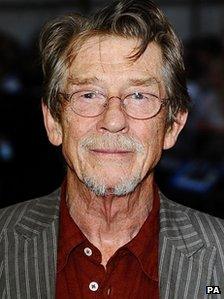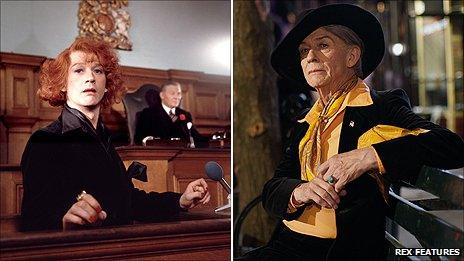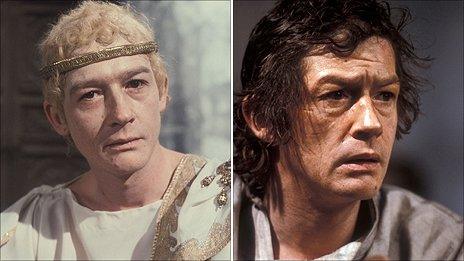John Hurt 'moved' by Bafta Outstanding Achievement
- Published

Hurt has previously won three Baftas and has been nominated seven times
John Hurt has received this year's Bafta for Outstanding British Contribution to Cinema. In a career which spans six decades, he has gone from an elephant man to a naked civil servant by way of an unfortunate spaceman dying one of Hollywood's most gruesome deaths.
But alongside his work in Hollywood fare including Indiana Jones and Hellboy, Hurt has continued to appear in British films, from smaller budget work such as 44 Inch Chest and the short film Sailcloth to bigger budget thrillers such as the multiple Bafta-nominated Tinker Tailor Soldier Spy.
During his career, he has twice been nominated for an Oscar. And prior to this latest recognition, he has also been in the running for seven Baftas, winning three times.
The Outstanding British Contribution to Cinema was introduced in 1978 and was presented to the special visual effects team on Superman. Last year it was given to the Harry Potter film series. Now this weekend, it will be Hurt's turn.
"I was doing Krapp's Last Tape in America," says Hurt in a room adjacent to the bar in Bafta's London headquarters. "And I got a message from my agent saying: 'Congratulations.'
"It really did strike me because the first time I got a Bafta, which was for The Naked Civil Servant, and I can remember somebody coming on and getting some kind of achievement and they seemed to be 105 and they talked," he pauses, "... forever."
Hurt's first Bafta nomination came as the wrongly executed Timothy John Evans in 10 Rillington Place - based on a true story, where he played opposite Sir Richard Attenborough's murderous John Reginald Christie.
His work on the film was praised but it was four years later that the star - born in Chesterfield - won his first Bafta for playing the flamboyant role of writer, raconteur and gay icon Quentin Crisp from youth to middle age in The Naked Civil Servant.
Two more Bafta-winning roles followed. Hurt played Max, an inmate of a brutal Turkish prison, in Midnight Express in 1978, landing him his first Oscar nomination.

Hurt reprised his role of Quentin Crisp in The Naked Civil Servant (left) in An Englishman in New York more than 30 years later
In 1980 he gave perhaps his best known international performance as Joseph Merrick - a man born with severe deformities who was exhibited in Victorian London as the Elephant Man.
Hurt, who performed under layers of make-up, was also nominated for an Oscar, but lost out to Robert De Niro for Raging Bull.
Two years later, one of the world's greatest actors, Sir Laurence Olivier, imparted some relevant words of wisdom to him.
"I remember Olivier, when I was playing the Fool in his King Lear, saying: 'When it comes to the obituary, they'll only ever mention three things, probably two, but if you're lucky three.' And of course when he died, they mentioned Richard III, Henry IV and either Marathon Man or Wuthering Heights.
"I mean, if you write your own obituary, I don't know, they'd take the things that got awards wouldn't they? So it would be Midnight Express, it would be Elephant Man and Naked Civil Servant probably."
And would Hurt be satisfied with the selection? "I won't be here, I'll be gone so it'll be entirely up to them," he chuckles.

Hurt's TV work for the BBC includes I, Claudius (left) and Crime and Punishment
Outside of the award-nominated film roles, Hurt's body of work spans genres and mediums.
In 1978, he died one of the most spectacularly bloody deaths in cinematic history as Kane, the doomed executive officer of the spaceship Nostromo in Ridley Scott's Alien.
The scene, during which a baby alien burst from Kane's chest cavity, passed into film lore when it was revealed Hurt's co-stars were only partially informed of what was to happen.
The resulting horrified looks on their faces are absolutely real and the scene made number four on Channel 4's 100 Greatest Scary Moments. Hurt even parodied the "chestburster" in Mel Brooks's comedy Spaceballs.
His breadth of work inevitably means not all of the films Hurt has starred in were box office hits, though he insists that some of those lower profile performances are among his favourites.
"I've done a few things like 1984, which when it came out was pretty well disregarded," he says. "But as time's gone on, it's become a kind of classic and there are many people who, if I get stopped in the street, it will be the first thing they mention.
"And then there's 44 Inch Chest, which people were suspicious about but I think it's a wonderful piece of writing.
He goes on: "I love things like The Proposition, I love things like The Hit, I loved Timothy Evans in 10 Rillington Place but it's very difficult to say what's more successful than something else."
Hurt took an interest in Lord Smith's report into the state of the UK film industry and accused Prime Minister David Cameron of "not quite understanding it" when he suggested funding should be directed towards "commercially viable" films.
"Nobody makes films for nobody to see them," says Hurt. "All the films we make here are part and parcel of the whole make-up of the film industry."
He suggests art house and experimental films "would be expected, certainly to make their budget back" but adds "out of that somebody will maybe take a idea and make something that is more successful. Everything feeds off each other".
He is now now 72 but, with several films currently in production, Hurt says he has no plans to retire. But has Hurt been so busy that he hasn't had time to prepare a Bafta speech?
"I'm sort of thinking about it, you always do," he says. "People tell you this and that, and you have to display some kind of cleverness in some way or another.
"But in the end it's kind of overwhelming because it's your peers who have given you this. That's important and, for once in my life, I've got to grow up and accept it graciously because I'm very moved."
Coverage of the Bafta Film Awards starts on BBC One at 2100 GMT on Sunday.
- Published27 January 2012
- Published18 November 2011